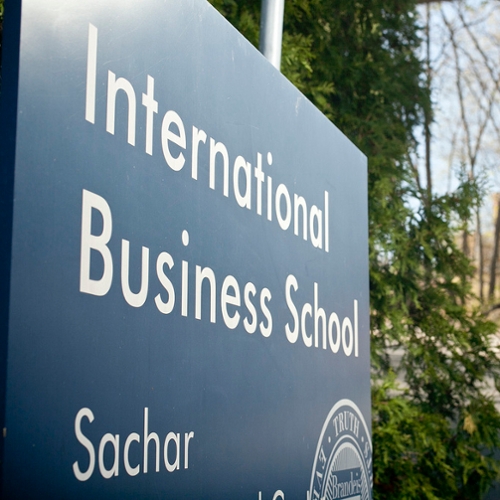
It’s a typical Tuesday at Brandeis International Business School. Professor Peter Petri has invited former student, Geir H. Haarde ’73, to speak with his class about the 2008 financial crisis, global economics and energy policy. It just so happens that in addition to being a Brandeis alumnus, Haarde served as the Prime Minister of Iceland from 2006 to 2009 after serving as Finance Minister and Minister for Foreign Affairs from 1998 to 2006. In 2015, Haarde took on the role of Ambassador of Iceland to the U.S. We sat down with him to learn about his career in economics and politics and of course, to hear about his time at Brandeis.
It was an offer I couldn’t refuse. I grew up in Iceland, and when it came time to decide on a college, I was offered a Wien Scholarship. I continue to feel indebted to the Wien family for the opportunities and experience that their generosity provided for me. It was the launching point for where I am today. Being a student at Brandeis was an excellent time in my life – I still fondly recall my time living in East Quad and eating in Kutz!
Don’t discount your early connections. Even in my current position, I’m still finding my connections and network from “the old days” incredibly helpful. Peter [Petri] is a great example. I took his class in my last semester at Brandeis; it also happened to have been his first semester teaching there. Here we are over 40 years later, and we’re still helping each other out.
It’s critical to understand that not everyone speaks English. Sure, it’s important to solidify your business skills and have a grasp of quantitative methods, but understanding another language allows you to grasp the cultural history that defines a country, its ways of life and ultimately, its ways of doing business. It will pay off in the long run to immerse in the language and culture of the places you wish to succeed in.
Today’s economy needs leaders who are comfortable interacting with other nations in an amicable way. The beggar-thy-neighbor policies from the ’30s are not the right way to go. International trade and investment are tools for growth. It’s important to try to understand the other party’s point of view in order to find a mutually beneficial deal for all involved. In politics as in life more generally, it is often necessary to be able to put yourself in other people’s shoes.
Featured Stories
News Categories
@BrandeisBusiness Instagram
View this profile on InstagramBrandeis Intl. Business School (@brandeisbusiness) • Instagram photos and videos

November 30, 2016
FEI, International Business School partner to enhance career preparation